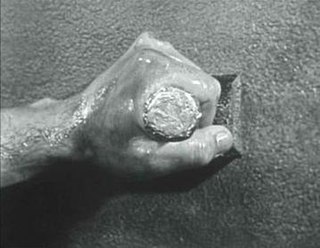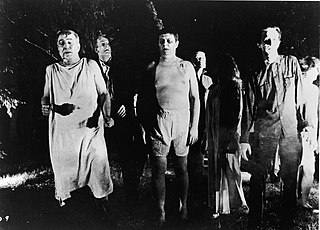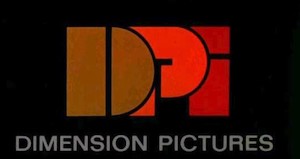The decade of the 1970s in film involved many significant films.

American International Pictures (AIP) is an American motion picture production label of Metro-Goldwyn-Mayer. In its original operating period, AIP was an independent film production and distribution company known for producing and releasing films from 1955 until 1980, a year after its acquisition by Filmways in 1979.

Pye Records was a British record label. Its best known artists were Lonnie Donegan (1956–1969), Petula Clark (1957–1971), the Searchers (1963–1967), the Kinks (1964–1971), Sandie Shaw (1964–1971), Status Quo (1968–1971) and Brotherhood of Man (1975–1979). The label changed its name to PRT Records in 1980, before being briefly reactivated as Pye Records in 2006.

Embassy Pictures Corporation was an American independent film production and distribution studio responsible for such films as Godzilla, King of the Monsters!, The Graduate, The Producers, The Lion in Winter, Carnal Knowledge, The Night Porter, Watership Down, Phantasm, The Fog, Prom Night, Scanners, The Howling, Escape from New York, and This Is Spinal Tap.

Mark VII Limited was the production company of actor and filmmaker Jack Webb, and was active from 1951 to his death in 1982. Many of its series were produced in association with Universal Television; most of them aired on the NBC television network in the U.S. Coincidentally, NBC and Universal are today part of the same company.
EMI Films was a British film studio and distributor. A subsidiary of the EMI conglomerate, the corporate name was not used throughout the entire period of EMI's involvement in the film industry, from 1969 to 1986, but the company's brief connection with Metro-Goldwyn-Mayer and Anglo-EMI, the division under Nat Cohen, and the later company as part of the Thorn EMI conglomerate are outlined here.

Screen Gems is a brand name of Sony Pictures' Sony Pictures Entertainment Motion Picture Group, a subsidiary of Japanese multinational conglomerate, Sony Group Corporation. It has served several different purposes for its parent companies over the decades since its incorporation, initially as a cartoon studio, then a television studio, and later on as a film studio.

Fritz the Cat is a 1972 American independent adult animated black comedy film written and directed by Ralph Bakshi in his feature film debut. Based on the comic strip by R. Crumb and starring Skip Hinnant, the film focuses on Fritz (Hinnant), a glib, womanizing and fraudulent cat in an anthropomorphic animal version of New York City during the mid-to-late 1960s. Fritz decides on a whim to drop out of college, interacts with inner city African American crows, unintentionally starts a race riot, and becomes a leftist revolutionary. The film is a satire focusing on American college life of the era, race relations, the free love movement and serves as a criticism of the countercultural political revolution and dishonest political activists.
Wolf C. Hartwig sometimes credited as Wolfgang C. Hartwig and Wolfgang Hartwig, was a German film producer working in exploitation genres.

Bryanston Distributing Company was an American film distribution company that was active during the 1970s. The company was founded by Louis Peraino and Philip Parisi in 1972. It went bankrupt in 1976, amid the company's numerous legal troubles.
Samuel Anthony Tenser was an English-born film producer of Lithuanian-Jewish descent. He began as the producer of low budget exploitation films before moving into mainstream productions.

I Drink Your Blood is a 1971 American exploitation horror film written and directed by David E. Durston, produced by Jerry Gross, and starring Bhaskar Roy Chowdhury, Jadine Wong, and Lynn Lowry. The film centers on a small town that is overrun by rabies-infected members of a Satanic hippie cult after a revenge plot goes horribly wrong.
The Constantin Film AG is a German mini-major film production and distribution company based in Munich. The company, which belongs to Swiss media conglomerate Highlight Communications AG, is a large independent German maker and distributor of productions in the entire field of audio-visual fiction and non-fiction. Company activity is based on the five pillars of film production/procurement of rights, TV production, film distribution, home entertainment and licence trading/TV exploitation. Constantin Film AG has released 36 of the 100 most successful German films of the last 20 years, including four of the Top 5: Manitou's Shoe, Traumschiff Surprise – Periode 1, Fack ju Göhte and Fack ju Göhte 2. The Fack ju Göhte trilogy was concluded in 2017 with Fack ju Göhte 3 and is now the most successful German film series of all time. Internationally, Constantin Film is best known for the successful Resident Evil film franchise, which has earned US$1.2 billion worldwide to date and is also known as the highest-grossing film series based on a video game. Most recent successes include TV series Shadowhunters, which won four People's Choice Awards in 2018. Constantin has also been involved in 20th Century Fox's Fantastic Four film franchise. Other productions include bestseller adaption The Silence and Monster Hunter.

The 1960s and 1970s mark the golden age of the independent B movie, made outside of Hollywood's major film studios. As censorship pressures lifted in the early 1960s, the low-budget end of the American motion picture industry increasingly incorporated the sort of sexual and violent elements long associated with so-called exploitation films. The death of the Production Code in 1968 and the major success of the exploitation-style Easy Rider the following year fueled the trend through the subsequent decade. The success of the B-studio exploitation movement had a significant effect on the strategies of the major studios during the 1970s.
In the film industry, four wall distribution is a process through which a studio or distributor rents movie theaters for a period of time and receives all of the box office revenue. The four walls of a movie theater give the term its name. Companies engaging in this practice were common in the United States during the late 1960s and 1970s; one of them was the Utah-based Sunn Classic Pictures.
Michael Klinger was a British film producer and distributor. After Tony Tenser, then a publicist became his business partner, the two men created the Compton cinema chain and distribution company and financed Repulsion (1965) and Cul-de-sac (1966) both directed by Roman Polanski. After their association ended, Klinger produced Get Carter (1971), starring Michael Caine, and Gold (1974), with Roger Moore in the lead, and was the executive producer of the 'Confessions' series of sex comedies with Robin Askwith.

Dimension Pictures was an American film studio founded in 1971, which primarily released exploitation and horror films. The studio went defunct in 1981, after which many of its films were acquired by 21st Century Film Corporation.

Dennis Earle Lambert is an American musician, songwriter and record producer.
Arthur Ronald Marks was an American film and television director, writer, producer and distributor best known for his work in the blaxploitation genre, directing films such as Bonnie's Kids, Detroit 9000, Friday Foster, Bucktown, The Monkey Hu$tle and J. D.'s Revenge. He also directed and produced numerous episodes of the American legal drama Perry Mason, as well as episodes of Starsky & Hutch, Mannix, I Spy, My Friend Tony, The Dukes of Hazzard, Steve Canyon, and Young Daniel Boone.
Manson International was an independent American film production company and distributor. The name was derived from the founders' surnames. Initially a distributor of foreign films, it became one of the pioneer film sales agencies in the country.









